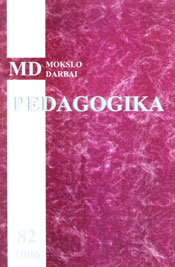Socialinio rengimo reikšmė sporto pedagogų gebėjimui kurti palankų pamokos psichologinį klimatą
The Importance of Social Training for the Ability of Sport Pedagogues to Create Favourable Psychological Climate in a Lesson
Author(s): Irina Žalienė, Romualdas MalinauskasSubject(s): Education
Published by: Vytauto Didžiojo Universitetas
Summary/Abstract: The problem of the research work is the question whether social training increases the ability of future sport pedagogues to create favourable psychological climate in a lesson. Pedagogical practice and practical training of social psychology and pedagogical ethics are interpreted in our work as social training. The work provides an assumption that after social training the ability of future pedagogues to create favourable psychological climate in a lesson is increased. The objective of the work is to demonstrate the impact of social training on the ability of sport pedagogues to create favourable psychological climate. Tasks of research: 1) to compare the ability of sport pedagogues to make initial contact before and after social training; 2) to estimate the ability of listening before and after social training; 3) to compare the ability to inspire mutual confidence before and after social training; and 4) to estimate the ability to strengthen mutual solidarity among schoolchildren before and social training. Research methods and organisation. The research employed the following methods: questionnaire (D. Aukstkalnyte’s description of students’ ability to create favourable psychological climate); mathematical statistics (χ² test). The description is prepared on the base of D. Aukstkalnyte’s theoretical and empirical model of communicational skills. The description enables to reveal the expression of these skills: to make initial contact, to listen to schoolchildren, to inspire mutual confidence among schoolchildren, and to strengthen mutual solidarity of schoolchildren. The description consists of 12 statements that define one or another empirical skill rate. Students have to describe each statement by defining their own performance level as high, average or low. Students of Lithuanian Academy of Physical Education were selected for the research because of the fact that the Academy prepares 80 percent of Lithuanian sport pedagogues. The research was organised in two stages. In 2002, 112 future sport pedagogues were tested. In 2003, the research was repeated. The tests were done with the same students. It was established that the ability of sport pedagogues to make initial contact with schoolchildren after social training has improved reliably (p < 0,05) and that the distribution of sport pedagogues according to the ability of listening is statistically reliably (p < 0,05) different before and after social training: after social training the level of this ability was higher. The research results proved that the ability of sport pedagogues to inspire mutual confidence among schoolchildren after social training showed no reliable improvement; however, the means of pedagogical effect applied during social training made significant impact (p < 0,05) on students’ ability to strengthen mutual solidarity among schoolchildren and in this way to create more favourable psychological climate.
Journal: Pedagogika
- Issue Year: 2006
- Issue No: 82
- Page Range: 80-84
- Page Count: 5
- Language: Lithuanian

